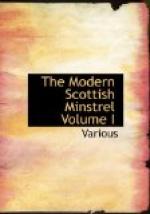Returning to Aberdeenshire, he was ordained a presbyter of the Episcopal Church, by Bishop Dunbar of Peterhead; and in November 1742, on the unanimous invitation of the people, he was appointed to the pastoral charge of the congregation at Longside. Uninfluenced by the soarings of ambition, he seems to have fixed here, at the outset, a permanent habitation: he rented a cottage at Linshart in the vicinity, which, though consisting only of a single apartment, besides the kitchen, sufficed for the expenditure of his limited emoluments. In every respect he realised Goldsmith’s description of the village pastor:—
“A man he was to all
the country dear,
And passing rich with forty
pounds a-year;
Remote from towns he ran his
godly race,
Nor e’er had changed,
nor wish’d to change his place.”
Secluded, however, as were Mr Skinner’s habits, and though he never had interfered in the political movements of the period, he did not escape his share in those ruthless severities which were visited upon the non-juring clergy subsequent to the last Rebellion. His chapel was destroyed by the soldiers of the barbarous Duke of Cumberland; and, on the plea of his having transgressed the law by preaching to more than four persons without subscribing the oath of allegiance, he was, during six months, detained a prisoner in the jail of Aberdeen.
Entering on the sacred duties of the pastoral office, Mr Skinner appears to have checked the indulgence of his rhyming propensities. His subsequent poetical productions, which include the whole of his popular songs, were written to please his friends, or gratify the members of his family, and without the most distant view to publication. In 1787, he writes to Burns, on the subject of Scottish song:—“While I was young, I dabbled a good deal in these things; but on getting the black gown, I gave it pretty much over, till my daughters grew up, who, being all tolerably good singers, plagued me for words to some of their favourite tunes, and so extorted those effusions which have made a public appearance, beyond my expectations, and contrary to my intentions; at the same time, I hope there is nothing to be found in them uncharacteristic or unbecoming the cloth, which I would always wish




